Cambyse Rouzé
Efficient Hamiltonian, structure and trace distance learning of Gaussian states
Nov 05, 2024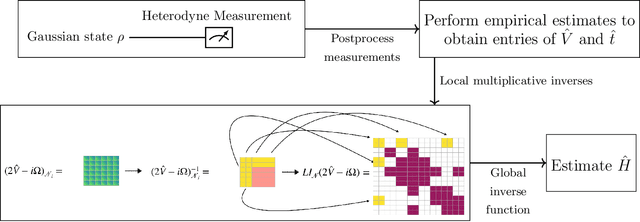
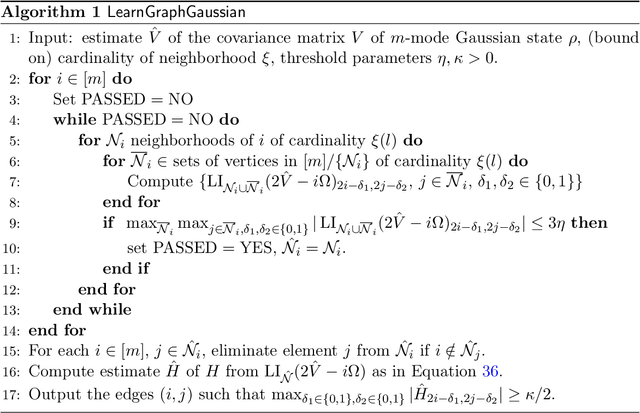
Abstract:In this work, we initiate the study of Hamiltonian learning for positive temperature bosonic Gaussian states, the quantum generalization of the widely studied problem of learning Gaussian graphical models. We obtain efficient protocols, both in sample and computational complexity, for the task of inferring the parameters of their underlying quadratic Hamiltonian under the assumption of bounded temperature, squeezing, displacement and maximal degree of the interaction graph. Our protocol only requires heterodyne measurements, which are often experimentally feasible, and has a sample complexity that scales logarithmically with the number of modes. Furthermore, we show that it is possible to learn the underlying interaction graph in a similar setting and sample complexity. Taken together, our results put the status of the quantum Hamiltonian learning problem for continuous variable systems in a much more advanced state when compared to spins, where state-of-the-art results are either unavailable or quantitatively inferior to ours. In addition, we use our techniques to obtain the first results on learning Gaussian states in trace distance with a quadratic scaling in precision and polynomial in the number of modes, albeit imposing certain restrictions on the Gaussian states. Our main technical innovations are several continuity bounds for the covariance and Hamiltonian matrix of a Gaussian state, which are of independent interest, combined with what we call the local inversion technique. In essence, the local inversion technique allows us to reliably infer the Hamiltonian of a Gaussian state by only estimating in parallel submatrices of the covariance matrix whose size scales with the desired precision, but not the number of modes. This way we bypass the need to obtain precise global estimates of the covariance matrix, controlling the sample complexity.
Learning finitely correlated states: stability of the spectral reconstruction
Dec 12, 2023



Abstract:We show that marginals of subchains of length $t$ of any finitely correlated translation invariant state on a chain can be learned, in trace distance, with $O(t^2)$ copies -- with an explicit dependence on local dimension, memory dimension and spectral properties of a certain map constructed from the state -- and computational complexity polynomial in $t$. The algorithm requires only the estimation of a marginal of a controlled size, in the worst case bounded by a multiple of the minimum bond dimension, from which it reconstructs a translation invariant matrix product operator. In the analysis, a central role is played by the theory of operator systems. A refined error bound can be proven for $C^*$-finitely correlated states, which have an operational interpretation in terms of sequential quantum channels applied to the memory system. We can also obtain an analogous error bound for a class of matrix product density operators reconstructible by local marginals. In this case, a linear number of marginals must be estimated, obtaining a sample complexity of $\tilde{O}(t^3)$. The learning algorithm also works for states that are only close to a finitely correlated state, with the potential of providing competitive algorithms for other interesting families of states.
Information-theoretic generalization bounds for learning from quantum data
Nov 09, 2023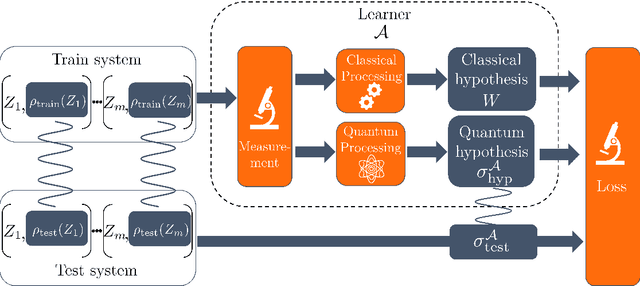
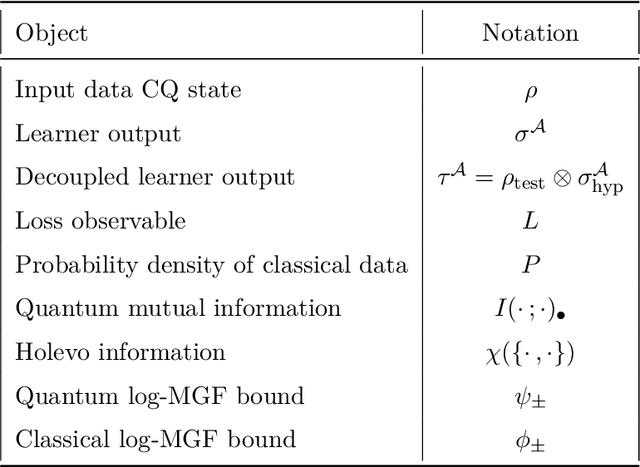
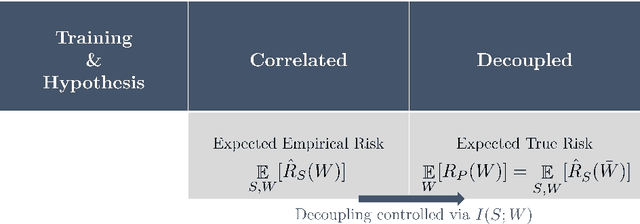
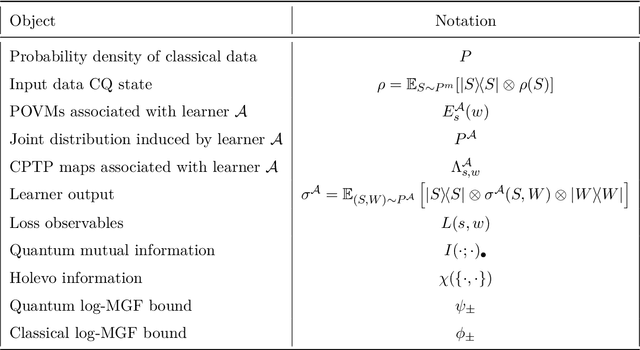
Abstract:Learning tasks play an increasingly prominent role in quantum information and computation. They range from fundamental problems such as state discrimination and metrology over the framework of quantum probably approximately correct (PAC) learning, to the recently proposed shadow variants of state tomography. However, the many directions of quantum learning theory have so far evolved separately. We propose a general mathematical formalism for describing quantum learning by training on classical-quantum data and then testing how well the learned hypothesis generalizes to new data. In this framework, we prove bounds on the expected generalization error of a quantum learner in terms of classical and quantum information-theoretic quantities measuring how strongly the learner's hypothesis depends on the specific data seen during training. To achieve this, we use tools from quantum optimal transport and quantum concentration inequalities to establish non-commutative versions of decoupling lemmas that underlie recent information-theoretic generalization bounds for classical machine learning. Our framework encompasses and gives intuitively accessible generalization bounds for a variety of quantum learning scenarios such as quantum state discrimination, PAC learning quantum states, quantum parameter estimation, and quantumly PAC learning classical functions. Thereby, our work lays a foundation for a unifying quantum information-theoretic perspective on quantum learning.
Quantum Differential Privacy: An Information Theory Perspective
Feb 22, 2022



Abstract:Differential privacy has been an exceptionally successful concept when it comes to providing provable security guarantees for classical computations. More recently, the concept was generalized to quantum computations. While classical computations are essentially noiseless and differential privacy is often achieved by artificially adding noise, near-term quantum computers are inherently noisy and it was observed that this leads to natural differential privacy as a feature. In this work we discuss quantum differential privacy in an information theoretic framework by casting it as a quantum divergence. A main advantage of this approach is that differential privacy becomes a property solely based on the output states of the computation, without the need to check it for every measurement. This leads to simpler proofs and generalized statements of its properties as well as several new bounds for both, general and specific, noise models. In particular, these include common representations of quantum circuits and quantum machine learning concepts. Here, we focus on the difference in the amount of noise required to achieve certain levels of differential privacy versus the amount that would make any computation useless. Finally, we also generalize the classical concepts of local differential privacy, R\'enyi differential privacy and the hypothesis testing interpretation to the quantum setting, providing several new properties and insights.
 Add to Chrome
Add to Chrome Add to Firefox
Add to Firefox Add to Edge
Add to Edge